Dogs in Mexico
The Mexican Attitude
For any animal lover who travels to or lives in Mexico, there are few harder subjects to deal with than the state of dogs in this country. Anyone who has driven around the countryside or spent any time in the Yucatan pueblos has seen far too many starving, mangy or neglected dogs. Fortunately, the dog situation in Merida and Yucatan seems to be undergoing a change over the last few years. Nowadays, there is a real dog park in Merida. There are Yucatecans actually walking their dogs and volunteering at dog shelters. This change can probably be attributed to the tireless work of many people, expatriates and Yucatecans alike, who have participated in Spay and Neuter clinics, put up billboards about caring for animals, and who have proposed and seen through the introduction of laws against animal abuse.
There is an entire segment of Mexican society that treats pets, especially dogs, the same way they are treated in the US or Europe. They are valued family pets, given their vaccinations, taken to the vet when they are sick, groomed regularly and loved as sentient beings.
The poorer Mexicans consider dogs a nuisance, an extra mouth to feed and often a dangerous animal to be avoided. Conversely, they might see dogs as a cheap home alarm system. And so dogs are often tied up and left barking, or left starving and often sick. Because of the way they are treated, they can be dangerous and sometimes should be avoided.
Spay and Neutering Dogs
The disconnect here is that Mexicans in general do not approve of sterilizing their dogs (it's a Catholic thing, we hear...) and/or they can't afford it. Over the last few years, the Spay and Neuter Clinics of Merida, Progreso and the rest of Yucatan have taken hold both in reality and in the minds of everyone in Yucatan. Spaying and neutering animals is becoming less anathema as a general idea, but still is often something that an individual Yucatecan may not want to do for their own pets.
Which brings us to AFAD. In Spanish, AFAD stands for Albergue Fransiscano del Animal Desprotegido. In English, that is Franciscan Shelter for Unprotected Animals. The woman who runs it is a woman named Lidia Saleh. She runs the shelter, which consists of a large plot of land which was donated to this cause. AFAD started with a two-room house that Lidia eventually fixed up to accommodate caring for a growing number of dogs. The dogs have covered cages with concrete floors. The shelter rescues dogs and cats from the streets and also takes dogs and cats whose owners no longer want them.
A Visit to AFAD
On the day we visited, years ago, one of the AFAD rescues was a big Staffordshire Bull Terrier who had apparently been used for fighting. He still sported a few cuts that were healing, but his disposition was sweet and loving with humans. Our photo shows him sitting on his new mat that we had just brought to him and thanking me in his own doggy way. Another one of AFAD's rescues that day was a purebred Doberman who was given to AFAD because he was 6 years old and his owner did not want to have to deal with him getting old and dying. Obviously, he was nowhere near death, but he was also not acclimated to other dogs, so he has to stay in a pen by himself.
Most of the dogs stay together in the main pen. Last time we were there, there were about 30 grown dogs, including beautiful golden labs, mutts, a dalmation and about 15 puppies. There were a few sick dogs that are being cared for and nursed back to health as well. The cats and kittens were kept in a separate location. What surprised us the most was how friendly, gentle and easygoing all these dogs are. We've gone into the main pen a few times now to meet and greet the dogs, and they all just want to be loved, petted and scratched behind the ears. There hasn't been any fighting or growling and they all seem pretty happy. They certainly did not seem like frightening or scary street dogs.
The shelter at the time was staffed full time with one person who worked hard to keep it clean, and fed the dogs, as well as watched over the dogs being nursed back to health. Lidia even then was busily promoting AFAD to the Spanish-speaking population so that Meridanos looking for a dog would think about AFAD and come rescue one from the shelter instead of buying one in a store. Even then, she carefully checked out the new owners and their homes to be sure that each dog was going to a better place.
Adopt a Dog in Merida Yucatan
If you are interested in adopting a dog or a cat, we encourage you to call AFAD or Evolucion (linked below) and arrange to meet the dogs there. Or just drop by between the hours of 10 in the morning and 6 pm.
Volunteering
If you would like to volunteer, AFAD would always like people to come and play with the dogs. And dogs like the Doberman need to be walked... a perfect job for a volunteer. If you are too busy to walk a dog, but you want to help, AFAD always needs donations. Not just money, but things like dog and cat food, bones and chew toys, blankets and towels (to line the boxes that they sleep in so they can stay warm at night), medicines, shampoos, etc. They are also hoping to build more kennels, so any sort of construction materials are welcome donations as well.
It would also be a big help if an English-speaking person here in Merida would help Lidia with her fundraising efforts. Just running the shelter and improving it so that it can help more dogs is heart-breaking and back-breaking work. Lidia also needs to organize dinners and other fundraisers to raise the money. If you are interested in donating money to the organization, please do so through the Paypal donation button at the end of this article.
For more information, check AFAD's website or their Facebook page, where you can see photos of dogs that are up for adoption on occasion. Or you can email at lidia_saleh@hotmail.com or call the shelter at 999-920-5019 or call Lidia on her cel phone at 044 999 947 6319. If you ask, Lidia can send you a full list of the medicines, supplies and other things that the shelter would like donated. *Anything* is appreciated and will be put to good use. So don't throw old towels, moving blankets or throw rugs away if they get ruined. Wash them as best you can and donate them to AFAD.
If you want to drop by, you will find the shelter on the road to Cholul, just past the Periferico, on the left across from the University Modelo. Just look for this sign. For more information on AFAD, please read their website here (in both Spanish and English). About halfway down the page, there is a list of items that you can donate that would be greatly appreciated.
The animals thank you in advance for your time, attention and kind consideration.
* * * * *
If you wish to donate money to AFAD, you may do so on their website.
Lidia and AFAD are not the only one taking on the issue of caring for the "unprotected animals" in the Yucatan, but they are one of the two most established groups in Merida. Other organizations that are helping animals in the Yucatan include:
- AFAD, one of Merida's non-profit animal shelters (discussed above) (located in Cholul, north Merida)
- Evolucion, Merida's other and most wonderful non-profit animal shelter (located in Uman, south Merida)
- Isla Mujeres Animal Shelter and Rescue
- Playa del Carmen Animal Rescue
- Animal Adoptions in Cancun (CANDI)
- Human Society of Cozumel




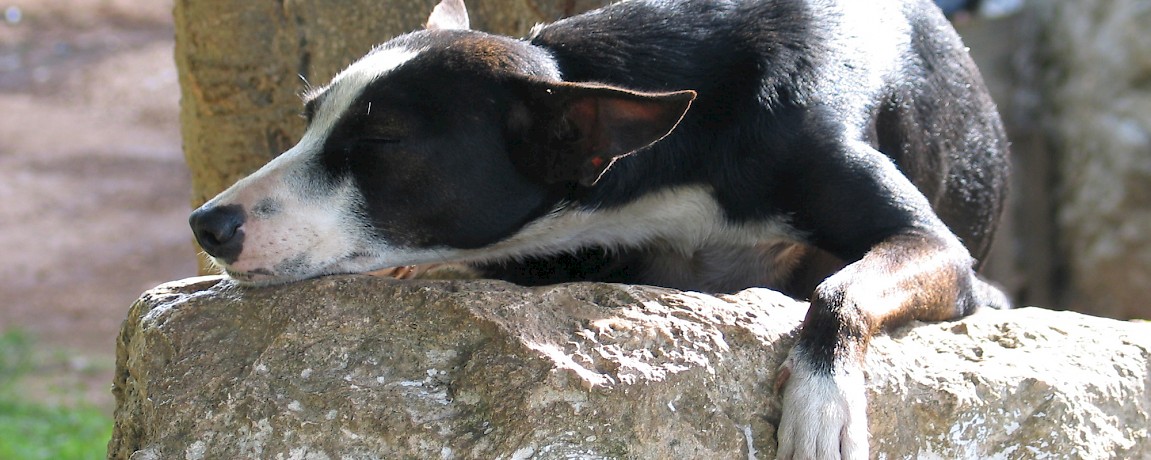


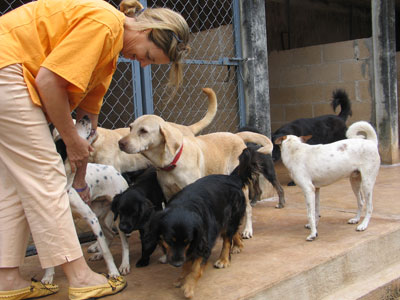
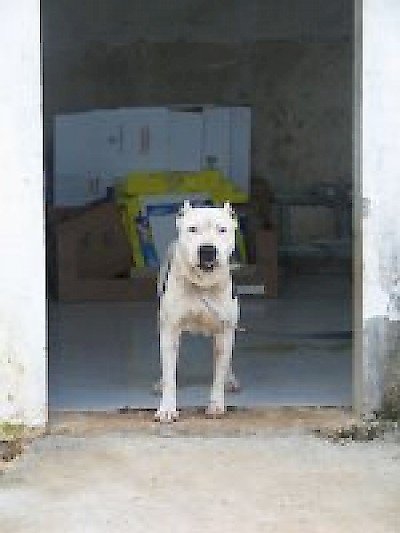
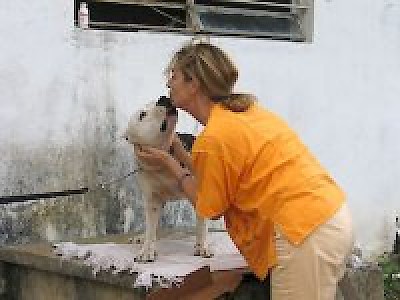
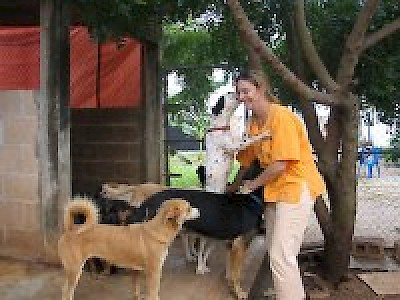
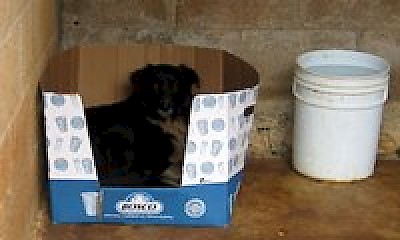
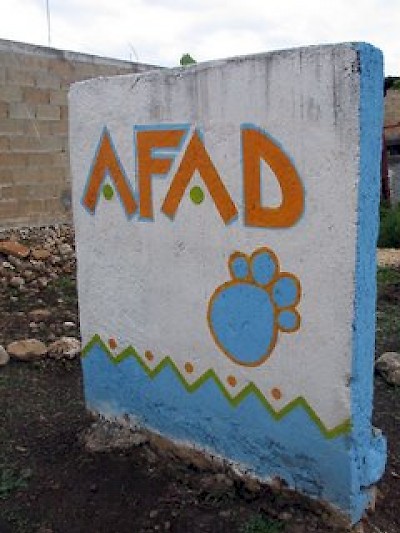

Comments
Leticia Cervantes 13 years ago
Please put your dog rescue group in FACEBOOK AND TWITTER so I can add them as a friend.
Reply
Ana 13 years ago
I live in Merida and I just took a beautiful dog that was living on the streets. This dog suffers from distemper but is making great progress! My problem is that I have my own dog and since I have to be careful that they are separated and be very cautious when touching her so that my dog doesn't get infected, I haven't been able to give the dog all the attention that I would want like playing with her, petting her, etc. I want to check if there might be somebody that doesn't already have a dog and can take better care of her than me. I am willing to pay for her food. She is just a wonderful dog, very friendly, one of the best dogs I have ever meet. Feel free to contact me if you think you can help anarh13@yahoo.com.mx
Reply
D. DeLanoy 13 years ago
This article is most informative. My partner and I are considering taking a full time vacation w/our 3 dogs and 2 cats in our large motor home in about 1.5 years...somewhere in the Yucatan is our goal but it will be narrowed down over time. We both qualify to administer veterinary assistant services and may be able to lend some Gringo help in this area. Thanks again for this article. I'm still looking for information on living in a motor home in the Yukatan and if anyone has info it would be super! Just e-mail me.
Thank you, D. DeLanoy
Reply
Xane Vázquez 14 years ago
I did not read one word regarding the State responsibility on this matter. Overpopulation could have been avoided if instead of focusing on sterilizing females only, a failed government program that started over 35 years ago, they would have focused on the males as well. On the other hand, its mortifying to read that a difference is made regarding the care provided between the poor and the people with means. I run an animal welfare in Campeche which has a long way to go for ending overpopulation and abandonment, and in our 7 year experience we can assure you that poor are no different to people with means regarding their pets. The difference is the high cost of veterinarian care which in Mexico is private, a bussiness. In México we have Federal, Sate and Municipal laws that have been designed to protect and control pets, but the majority does not know of their existence, therefore nobody demands their immediate application leaving the problem to the people. If Mexico's half of its population lives in total poverty its the State the one to blame. If you can not afford to provide your own child with his primal necessities, it is clear that the families pet will be left behind. It is the State, with the collaboration of the society that must provide AFFORDABLE, REACHABLE and CONSTANT spay & neuter campaigns, as well as veterinarian care in general, amongst other reasons, because of disease transmitted primarily to children and elders.
Reply
Dr. Robert Fisher 14 years ago
I will be living at my house in Sisal, I am a retired veterinarian. Could you use my help? I still have an active license and dea form in California.
Reply
Jennifer Harrison 14 years ago
Recently, while traveling in Mexico, I met 2 feral kittens living on a resort. Both were skinny but being fed by local tourists. I would be interested in learning how to bring these cats to the US, if possiable, and was hoping you would know where to start? You are the ONLY forum I can find about ANY animals in Mexico. You are doing great work!
Thanks for any help you can provide.
Jenny
Reply
Working Gringos 14 years ago
Jamie,
We suggest you contact Debbie Moore at YAPA. She also has a public relations background and I'm sure she would appreciate the help. You can email her at debobway@gmail.com.
Reply
jamie scott 14 years ago
Jeff Young with Planned Pethood Plus suggested I contact you. I am a vet who had a lot of trouble with vet schools do to political reasons and wish to work somewhere that really needs the help. I am used to working in countries other than the US, as I went to school in the Caribbean and was one of the few successful students to have a predominantly Catholic society(I'm Christian and my step father's Catholic so I am aware of the bias towards not spaying and not aborting puppies) spay and neuter their animals voluntarily. I also used to work film production so publicity is my specialty. I would like to come and work even if it's for a little while with you, would you mind contacting me? I don't often check email but my cell is 720-878-5788
thanks
jamie
Reply
viraj 15 years ago
i like dogs. i want to come lifetime in mexico for dogs in AFAD. my age is 19 . i really want to come in mexico. i really want to do somthing for dogs . i have an idea about dogs . if we use this idea we can make our AFAD branches all over the world. i am from india . in india people take only top breeds . no one take street dogs . my pocket money amount is 50rs per week . but i use 40rs per week for food of street dogs. so please read this message . i want to come mexico . so anyone intrested in my idea about dogs please call me. MY CELL NO IS 9545872457 or 9975071845. (india) i dont have any dog becuz my home is small.
Reply
Ray 15 years ago
Cherie,
We brought our dogs with us to Merida. One is a yellow Lab and the other is an English Mastiff (she now weighs 191 pounds...). You will find it difficult if not impossible to fly your dogs as the airlines have quite strict guidelines about this. One is the size of the crate and our crate for the Mastiff was too large. The other is that giant breed dogs are on a no fly list into Mexico due to heat concerns. I even tried FedEx, no go.
We drove all the way from Vancouver, BC. Make sure you have an up-to-date health certificates and shots and have certified copies in Spanish too. The certificates need to be issued within 14 days or less of your crossing the border into Mexico.
Good Luck.
Reply
Cherie Anderson 15 years ago
I have a question for all that have imported LARGE DOGS into Mexico. Did you fly, what should I expect? I plan to bring 2 Great Danes with me to Cancun.
Thanks
Cherie
Reply
« Back (20 to 31 comments)Next »